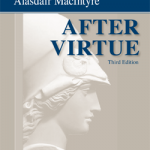The first plenary speaker at Acton University was a Senegalese entrepreneur named Magatte Wade, a dynamic speaker who was featured extensively in the documentary “Poverty Inc.,” produced by Acton several years ago. Wade has founded several companies which market African products and techniques to Western consumers, including beverages and skin care products. She began her talk by saying that she had always been “haunted” by the death toll among her fellow Senegalese who had tried to escape the lack of economic opportunity in their own country by fleeing to Western Europe by boat, and had drowned in large numbers. This was an effective opener, because few people in the Western world are aware of these tragedies compared to the more publicized deaths of Syrian refugees in recent years. Thoughout the lecture, Wade pressed this rhetoric, arguing that her approach addresses the problems faced by Africans and that other approaches, however well-intentioned, are clueless or even implicitly racist.
Wade’s approach is a thoroughly free-enterprise one. By her own account, she became a believer in the importance of private enterprise after leaving her first company. Before that time, she was “deep left,” but in the period of soul-searching that followed her exit from the beverage-making firm she had founded, she came to believe that the fundamental problem with African countries was their ongoing poverty caused primarily by the lack of opportunities for local businesses. She now not only practices entrepreneurship but also “preaches” it around the world (including before the UN) and advocates for changes in policy that allow more Africans and other underprivileged people to have access to the free market. She suggested that a very important resource for anyone interested in alleviating poverty is the Doing Business Index, which ranks the countries of the world by various measures of how easy it is to start and maintain a business there.
Wade makes a powerful case for the importance of free enterprise in lifting people out of poverty and also in preserving cultural diversity. But I question whether one can reduce the woes of Africa to a lack of access to business opportunities. She seems dismissive of arguments that blame the influence of colonialism (while arguing, persuasively, that the foreign aid system is a form of “neo-colonialism”). I take the point that we need to focus on problems that they can do something about–no one can go back and undo colonialism, and arguably the best way for Western nations to stop participating in colonialism is to rethink how we do foreign aid. But it seems likely to me that there is more than one cause, and more than one solution, for the problems that “haunt” her.
As for cultural diversity, Wade hopes to preserve African culture by making it “cool.” She argues that cultures survive and flourish by getting their “brands” accepted worldwide. But I’m not sure that I’d agree that international knowledge of American brands (such as Hollywood movies) really preserves what is valuable in American culture. I admire what Wade is doing immensely, but preserving one’s culture by making it “cool” strikes me as having some potentially ironic consequences.
Wade calls for a focus on “small to medium” businesses rather than either large corporations or “microbusinesses,” arguing that focus on the latter in the case of Africa is patronizing and implicitly racist. I’m not sure that is fair–many of us of a “distributist” bent want to see more “microbusinesses” in the U.S. as well. But Wade would also argue that the “small and medium” enterprises contribute more to economic growth than either of the extremes to each side do.
She is dismissive of the criticism that corporations sometimes exploit workers, not because she takes such abuse lightly but because she considers any job preferable to no job, arguing that no one would prefer to stay home. As my wife pointed out: what about stay-at-home parents? The assumption seems to be that without a “regular job” a person cannot be engaged in meaningful activity. This does indeed give carte blanche to employers to set the terms of employment, it seems to me.
Finally, there’s an interesting religious angle to Wade’s views. In the Q and A, it transpired that she is a Sufi Muslim, a member of an order called the “Mourides” who are very large and influential in Senegal. The Mourides, it turns out, have a history of regarding hard work as an essential part of the spiritual life–the BBC article to which I linked above calls them “Senegal’s Mystical Entrepreneurs.” Similar views are found in Sikhism. Wade frequently spoke of her message of antrepreneurship as something she was called of God to “preach.” This attitude seems to fit quite well into her religious tradition.
But does it fit equally well into Christian tradition? This is a point I raised in my posts last year, and will be raising again this year.
In the meantime, Magatte Wade’s plenary speech was a wonderful way to open Acton University. She brought religious as well as ethnic and gender diversity to the roster of plenary speakers, and she provided an eloquent challenge to those of us who worry about the effects of the global economy on the underprivileged.











